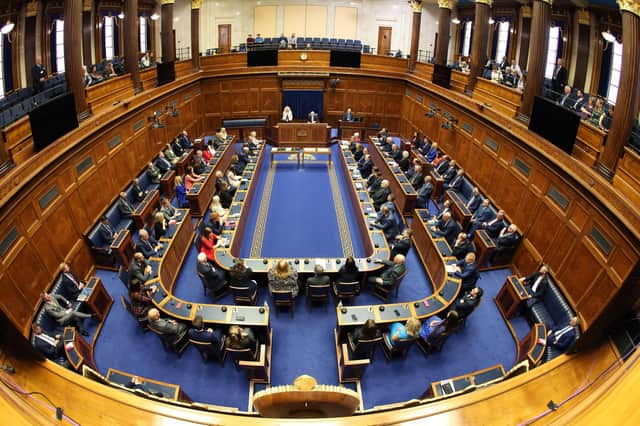Owen Polley: In any council election post-mortem, unionism should focus on the basics rather than obsess about party affiliation


Sir Jeffrey Donaldson acknowledged the need for a “big conversation about where we’re going,” while Mike Nesbitt speculated about the benefits of “realignment”.
If these discussions do take place, hopefully, rather than obsess about party affiliation, they cover the basics first: asking what unionists want to achieve and, realistically, what is achievable in today’s Northern Ireland. That may mean taking into account changes in society, or even in our political set-up, that many of us do not like, but are unlikely to be reversed.
Advertisement
Hide AdAdvertisement
Hide AdThen there is the question of presentation, which sounds trivial, but is actually central. How can unionists explain their ideas in a more sympathetic and appealing way?
That debate will include asking how they can reach people who have, for the time being, moved away from pro-Union parties, as well as new voters who are making electoral decisions for the first time.
Equally crucially, it should examine how Northern Irish unionists can command more goodwill and influence in the rest of the country, particularly at Westminster. We want to be considered an important and valued part of the UK, after all, rather than a problem that needs to be solved.
The third thing that unionists might consider, is how exactly they define good government, and indeed successful government, in Northern Ireland, as well as in the UK overall.
Advertisement
Hide AdAdvertisement
Hide AdWe want people to feel as happy, included and prosperous as is possible. But what does that look like and how can it be achieved?
There may be trade offs to contemplate in this discussion. To take a high profile national example, there is currently a debate about large scale immigration, which some economists say is necessary to create prosperity, but other commentators claim damages people’s sense of belonging and identity.
Locally, during the council election campaign, the UUP suggested that the Windsor Framework, and the continued authority of the EU here, created problems for Northern Ireland but also provided opportunities for prosperity. The counter argument is that, over time, it will erode our sense of Britishness and the constitutional link to the rest of the UK.
For some people that’s of secondary importance, but for many unionists it’s critical to their happiness and identity.
Advertisement
Hide AdAdvertisement
Hide AdIt shows that these are complicated issues, with few easy answers. But there are opportunities, I believe, for pro-Union parties to set out policies that are distinctive, compelling and persuasive.
For instance, there is no local party, right now, that is prepared to explain how populist policies at Stormont, like free prescriptions, bus passes and the lack of water rates, affect our financial position and impact public services negatively. There is no local party that argues genuinely that responsible government sometimes involves taking difficult and unpopular decisions, like centralising medical expertise in fewer, better acute hospitals.
Most of all, few politicians acknowledge that our economy is too dependent on the public sector and propose changes that could save money and provide more space for enterprise.
If unionists took this approach, it would involve stepping back from the implication that most of our problems could be solved by Westminster providing more money. If they did petition the Treasury for increased funding, it would be on the basis that it would be invested in large-scale reforms, to make our finances more sustainable in the future.
Advertisement
Hide AdAdvertisement
Hide AdOf course, at the moment, we do not know whether devolved government will return to Northern Ireland this year and there are many unionists who think we’re better off without it. The stated view of the DUP, though, never mind the UUP, is that it’s important to get Stormont back.
If that happens, the increased prominence of Sinn Fein, with its pastiche of left-wing politics, and its endless need to create grievances against Westminster, will make actually providing good government all but impossible. Surely, though, there is potential for unionists to cast themselves as the responsible adults in an Assembly full of political children?
At the very least, it would avoid them reinforcing the nationalist myth that things would be wonderful if it weren’t for the pernicious influence of the “Brits” in London.
The notion has also taken hold that, for unionists to reach young people, they must become “progressive” or left wing. The current trends with youth votes in other parts of the world suggest otherwise. Pro-union politicians in Northern Ireland will never, and should never, start spouting gibberish about “heteronormativity” or “toxic masculinity”, for example. Even if this stuff weren’t so pernicious, nobody would believe it was genuine.
Advertisement
Hide AdAdvertisement
Hide AdThey can and should, though, sound sensible, serious and sympathetic. The way that unionism is organised politically – through one party, or two, or three – is less pressing than its need to articulate ideas successfully and persuade people that they are important.
In this column, I’ve spent less time talking about getting Northern Ireland to play a more central role in the UK – participating in national debates, political life, the economy and culture more constructively and wholeheartedly than before. But that’s another indispensable aspect of the conversation unionism must have.
Our political leaders have assured us that they will start these discussions, and confront these topics soon. Let us hope, for unionists’ future electoral prospects, that they are in earnest.